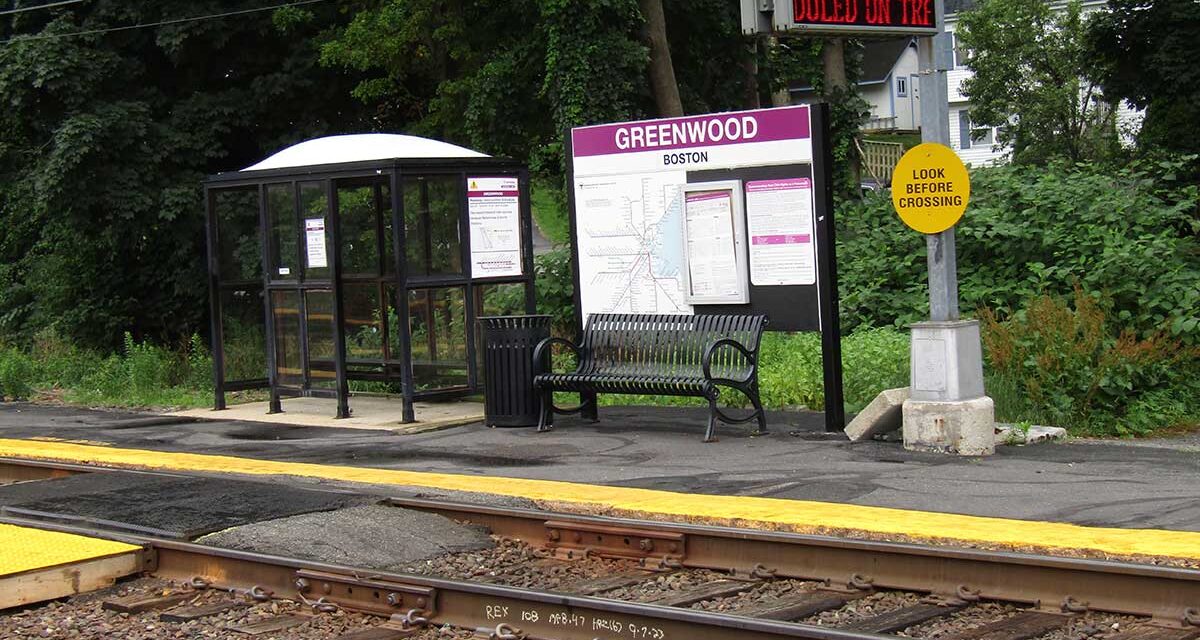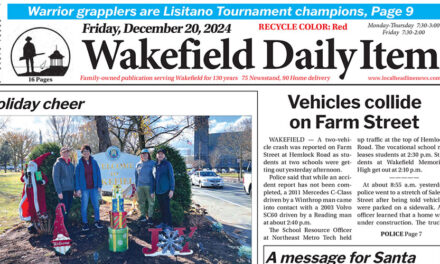By MARK SARDELLA
WAKEFIELD — The first public forum held by the Town Council’s 40A Subcommittee lasted three hours and was at times repetitive, occasionally confusing and sometimes contentious. Last week’s forum, held in the Community Room at the Public Safety Building, aimed to gather public feedback to guide the subcommittee in creating a new plan to comply with the state’s MBTA communities multifamily zoning mandate under Mass General Law 40A Section 3A.
The law requires all MBTA communities, including Wakefield, to create at least one multi-family zoning district of reasonable size near public transit in which multi-family housing is permitted as of right. “As of right” means that a property owner or developer may proceed without obtaining a Special Permit, variance, zoning amendment, waiver, or other zoning approval. In the proposed district, the plan would allow up to four units in a three-story building with a height of up to 35 feet on a minimum lot size of 4,000 square feet.
Towns that don’t comply with the state mandate by the Dec. 31, 2024 deadline face penalties including loss of state grant opportunities. The Attorney General has also threatened legal action for noncompliance.
The 40A Subcommittee comprised of Town Council chairman Michael McLane and councilors Edward Dombroski and Robert Vincent was formed after three different compliance plans were rejected by voters at the Annual Town Meeting last May. One of the plans, created by a Working Group of the Planning Board, exceeded the state requirements in terms of both geographical area and number of multifamily units allowed. Two different “minimum compliance” plans – one offered as an alternative by the Planning Board and one submitted by citizen petition – were also rejected at Town Meeting in May.
Last week’s public forum took place in a hybrid format, with many residents participating in person and others joining via Zoom.
After a brief introduction and opening remarks, McLane turned to the town’s Senior Planner, Samantha Elliot, to review the state law and the ways that Wakefield could approach compliance. While the three earlier plans rejected by Town Meeting all centered around the North Avenue commuter rail station, the new 40A Subcommittee has indicated a preference for a more diffuse, less residential district that would also include areas of town near the Greenwood train station and Melrose Highlands. It was noted that a community survey to gather public feedback had generated over 700 responses as of last week’s forum.
Elliot discussed the grant funding that could be at risk if the town doesn’t comply with the state mandate. She noted that in the past three years, Wakefield has received $3.7 million in state grants, including a $2 million MassWorks Grant in 2022 for North Avenue water main improvements; a 2024 HousingChoice Grant for a Housing Production Plan ($79,000); and a 2024 HousingWorks Grant of $572,913 for the Hopkins Street sidewalk extension.
In addition to those kinds of grants, Elliot noted that on March 15, 2023, the state added an additional 14 programs to the list of grant opportunities that non-compliant towns will be ineligible to receive.
When last week’s forum was opened to the public, Bill Tubbs of Hancock Road asked if existing or under-construction housing units such as the project at the head of the Lake could be included in the town’s compliance plan. The responses seemed to create more confusion, with Elliot stating that the area in question could be part of the allowed 25 percent of the district not near public transit. But McLane and Town Administrator Stephen P. Maio said that units already built or permitted cannot be counted towards compliance.
Eva Arbuckle of Emerson Street complained that her neighborhood, which would be directly impacted, had gotten no communication regarding the MBTA multifamily zoning mandate.
“We had no idea this was happening,” she said.
Scot McCauley of Walden Road wondered why a new compliance plan was even being considered after voters made their wishes clear at Town Meeting last spring when they rejected three different plans.
Subcommittee member Robert Vincent said that in his view, it would be irresponsible if town leaders did not at least try to come up with a new plan for voters to consider at the fall Town Meeting.
Subcommittee chairman Mike McLane noted that the committee is trying to create a plan that is very different from the three offered at the spring town meeting. He indicated that if fall Town Meeting rejects the new plan created by the 40A Subcommittee that will be the end of it.
“I’m not falling on my sword,” he said.
Bill Merullo of Karl Road said that most residential homeowners will not be able to afford these kinds of conversions, so developers will swoop in and buy up properties and convert them to multifamily homes.
He echoed McCauley’s point that the voters have already said “no.”
“Why not stand up to the state?” he asked.
McLane responded that voters could do that at the fall Town Meeting.
Noah Thompson of Main Street supported the effort to create a new compliance plan, maintaining that noncompliance will mean more taxes to offset lost grant money. He also said that more people taking the train would mean less traffic.
“There’s a lot we could lose by not going forward with any plan,” he said.
But Ellen Cummings of Nahant Street had a different perspective.
“We are able to trash our own community without help from the state,” she said. “We don’t need more building. You’ve already trashed the town of Wakefield.”
Deborah Fox of Allyssa Drive agreed.
“What the state is doing to us is extortion,” she said, adding that local zoning should be left to the town.
Brandon LaRoche of Dellano Lane made the point that studies have shown that increasing the number multifamily homes causes the price of single-family homes to go up, because as more homes are converted to multifamily, single-family homes become scarcer.
McLane agreed. “I don’t buy the idea that building more will bring prices down,” he said.
Cedar Street resident Jane McConnell questioned the premise that people who live near the train will have fewer cars. She described the traffic on the West Side that has already resulted from new developments.
“You don’t understand the impact we’ve already had,” she said.
Dennis Cloherty of Harvest Road said that the state law was aimed at communities like Wakefield that have “snob zoning.” He said that there is no requirement to have any kind of zoning and Wakefield should just relax its zoning to allow more multifamily housing.
Marcy McCauley of Walden Road said that the town has a fixed amount of land and a fixed number of schools. She said that she was concerned about the state “constantly taking away our zoning rights” as well as the impact of more multifamily housing on taxes.
“We have to take a stand,” she said
Bill Merullo maintained that supply and demand have nothing to do with housing prices because there is so much government involvement with housing. He also insisted that the idea that people living near the train station will take the train rather than drive is a false premise.
Julie Scott of Central Street agreed, observing that most people don’t work in Boston but commute to jobs that require them to drive.
The 40A Subcommittee has indicated that there will be further opportunities for the public to provide feedback. The MBTA 40A Multifamily Zoning Survey is available on the town’s website at wakefield.ma.us/.





